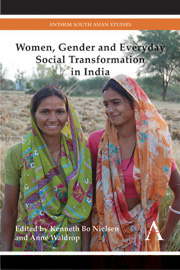Book contents
- Frontmatter
- Contents
- Acknowledgments
- Women and Gender in a Changing India
- PART I WORK, TECHNOLOGY, ASPIRATIONS
- PART II DEMOCRACY AND THE DEVELOPMENTAL STATE
- Chapter Seven Gender and Democratization: the Politics of Two Female Grassroots Activists in New Delhi
- Chapter Eight The Reproductive Body and the State: Engaging with the National Rural Health Mission in Tribal Odisha
- Chapter Nine A Veiled Change Agent: the ‘Accredited Social Health Activist’ in Rural Rajasthan
- Chapter Ten Disciplining Gender and Gendering Discipline: Women's Studies in Contemporary India
- PART III ASSERTIONS AND ACTIVISM
- About the Editors and Contributors
Chapter Ten - Disciplining Gender and Gendering Discipline: Women's Studies in Contemporary India
from PART II - DEMOCRACY AND THE DEVELOPMENTAL STATE
Published online by Cambridge University Press: 05 October 2014
- Frontmatter
- Contents
- Acknowledgments
- Women and Gender in a Changing India
- PART I WORK, TECHNOLOGY, ASPIRATIONS
- PART II DEMOCRACY AND THE DEVELOPMENTAL STATE
- Chapter Seven Gender and Democratization: the Politics of Two Female Grassroots Activists in New Delhi
- Chapter Eight The Reproductive Body and the State: Engaging with the National Rural Health Mission in Tribal Odisha
- Chapter Nine A Veiled Change Agent: the ‘Accredited Social Health Activist’ in Rural Rajasthan
- Chapter Ten Disciplining Gender and Gendering Discipline: Women's Studies in Contemporary India
- PART III ASSERTIONS AND ACTIVISM
- About the Editors and Contributors
Summary
The first rule of thumb when opening the discussion in the MA optional course on Women's Movements and Gender Studies – a course I teach regularly as part of the Centre for Women's Studies in my university – is to emphasize that gender is not a synonym for women. This statement, as much as it succeeds in creating a level of curiosity among students about conceptual distinctions, is also a reminder to all practitioners within the humanities and social sciences that women's studies is not a ‘compensatory’ branch of any discipline. The approach of ‘add women and stir’ is insufficient for any discipline to become gender sensitive. In the context of a vast feminist literature on the transformative potential of gender as an analytical perspective and of woman as a political category, it may seem to be a case of belabouring the obvious that disciplining gender and gendering academic disciplines are simultaneous processes. The contours of this new academic terrain – fundamental transformations within established academic disciplines and creating new interdisciplinary spaces – have been drawn through the long and intense interaction between the intellectual engagement and political work of feminism. What was at stake for women's studies in its formative years in the European and North American academia during the 1960s and 1970s concerned contestation of a particular kind of production and dissemination of knowledge, where gender blindness and gender bias marked the nature of scholarship.
- Type
- Chapter
- Information
- Women, Gender and Everyday Social Transformation in IndiaA Revisionary History, pp. 157 - 172Publisher: Anthem PressPrint publication year: 2014



